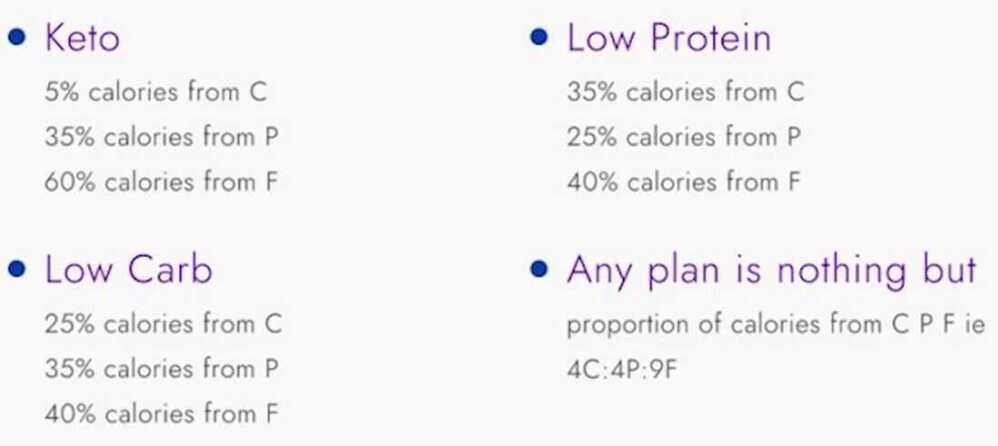Daily Requirements
Macronutrients
-
Providing energy (Carbs, Protein, Fats)
-
Protein (meat, dairy, legumes, nuts, seafood and eggs)
-
Standard amino acids
- Alanine
- Arginine
- Aspartic acid (aspartate)
- Asparagine
- Cysteine
- Glutamic acid (glutamate)
- Glutamine
- Glycine
- Histidine
- Isoleucine(branched chain amino acid)
- Leucine(branched chain amino acid)
- Lysine
- Methionine
- Phenylalanine
- Proline
- Serine
- Threonine
- Tryptophan
- Tyrosine
- Valine(branched chain amino acid)
-
Fats / lipids (oils, butter, margarine, nuts, seeds, avocados and olives, meat and seafood)
- Butyric acid(C4)
- Caproic acid(C6)
- Caprylic acid(C8)
- Capric acid(C10)
- Lauric acid(C12)
- Myristic acid(C14)
- Pentadecanoic acid(C15)
- Palmitic acid(C16)
- Margaric acid(C17)
- Stearic acid(C18)
- Arachidic acid(C20)
- Behenic acid(C22)
- Lignoceric acid(C24)
- Cerotic acid(C26)
- Linoleic acid(LA) - an essential fatty acid
- α-Linolenic acid(ALA) - an essential fatty acid
- Stearidonic acid(SDA)
- Arachidonic acid(ETA)
- Timnodonic acid(EPA)
- Clupanodonic acid(DPA)
- Cervonic acid(DHA)
These 2 essential fatty acids are the starting point for other important omega-acids (e.g. DHA, EPA)
-
α-Linolenic acid ALA (18:3)Omega-3 fatty acid
-
Linoleic acid LA (18:2)Omega-6 fatty acid
-
Not providing energy
- Water
- Fiber
Dietary fiber
Dietary Fiber or roughage is the portion of plant-derived food that cannot be completely broken down by digestive enzymes.
It has two main components -
- Soluble fiber - which dissolves in water -- is readily fermented in the colon into gases and physiologically active by-products, such as short-chain fatty acids produced in the colon by gut bacteria; it is viscous, may be called prebiotic fiber, and delays gastric emptying which, in humans, can result in an extended feeling of fullness.
- Insoluble fiber - which does not dissolve in water -- is inert to digestive enzymes in the upper gastrointestinal tract and provides bulking.Some forms of insoluble fiber, such as resistant starches, can be fermented in the colon.Bulking fibers absorb water as they move through the digestive system, easing defecation.
- Antioxidants
Micronutrients
-
Minerals
- Calcium
- Chlorine
- Magnesium
- Phosphorus
- Potassium
- Sodium - 2300 mg, Salt - 6 gm/day - 1 teaspoon/day
-
Milk and dairy products are a good source of calcium and magnesium
-
Red meat is a good source of iron and zinc
-
Seafood and vegetables (depending on the soil in which they are produced) are generally good sources of iodine
-
Trace minerals
-
Vitamins
- Vitamin B complex
- Vitamin B1(thiamin)
- Vitamin B2(riboflavin)
- Vitamin B3(niacin)
- Vitamin B5(pantothenic acid)
- Vitamin B6group:
- Pyridoxine
- Pyridoxal-5-Phosphate
- Pyridoxamine
- Vitamin B7(biotin)
- Vitamin B8(ergadenylic acid)
- Vitamin B9(folic acid)
- Vitamin B12(cyanocobalamin)
- Choline
- Vitamin A (e.g. retinol (see also - provitamin A carotenoids))
- Vitamin C (Ascorbic acid)
- Vitamin D
- Vitamin E (tocopherol)
- Vitamin K
- Carotenoids
- Vitamin B complex
-
Fruits and vegetables are generally good sources of Vitamin C and A and folic acid (a B group vitamin)
-
Grains and cereals are generally good sources of the B group vitamins and fibre
-
Full-fat dairy and egg yolks are generally sources of the fat soluble vitamins A, D and E
-
Milk and vegetable or soya bean oil are generally good sources of vitamin K, which can also be synthesised by gut bacteria

Protein
Health Guidelines for Indians by Indian Council of Medical Research
As per ICMR an adult should consume 0.8g-1g of protein as per his body weight. For someone who is an active person, protein requirement is 1g-1.2g of their body weight. Proteins provide amino acids which are vital for almost every function of the body. Include protein rich foods such as chicken, fish, eggs, paneer, lentils, beans, nuts and seeds to fulfil your daily protein requirements.
Combining cereals with pulses in the ratio of 3:1 will improve the protein quality of your meal as per ICMR.